The three longest days of February. The beginning of the great war which no one thought would come
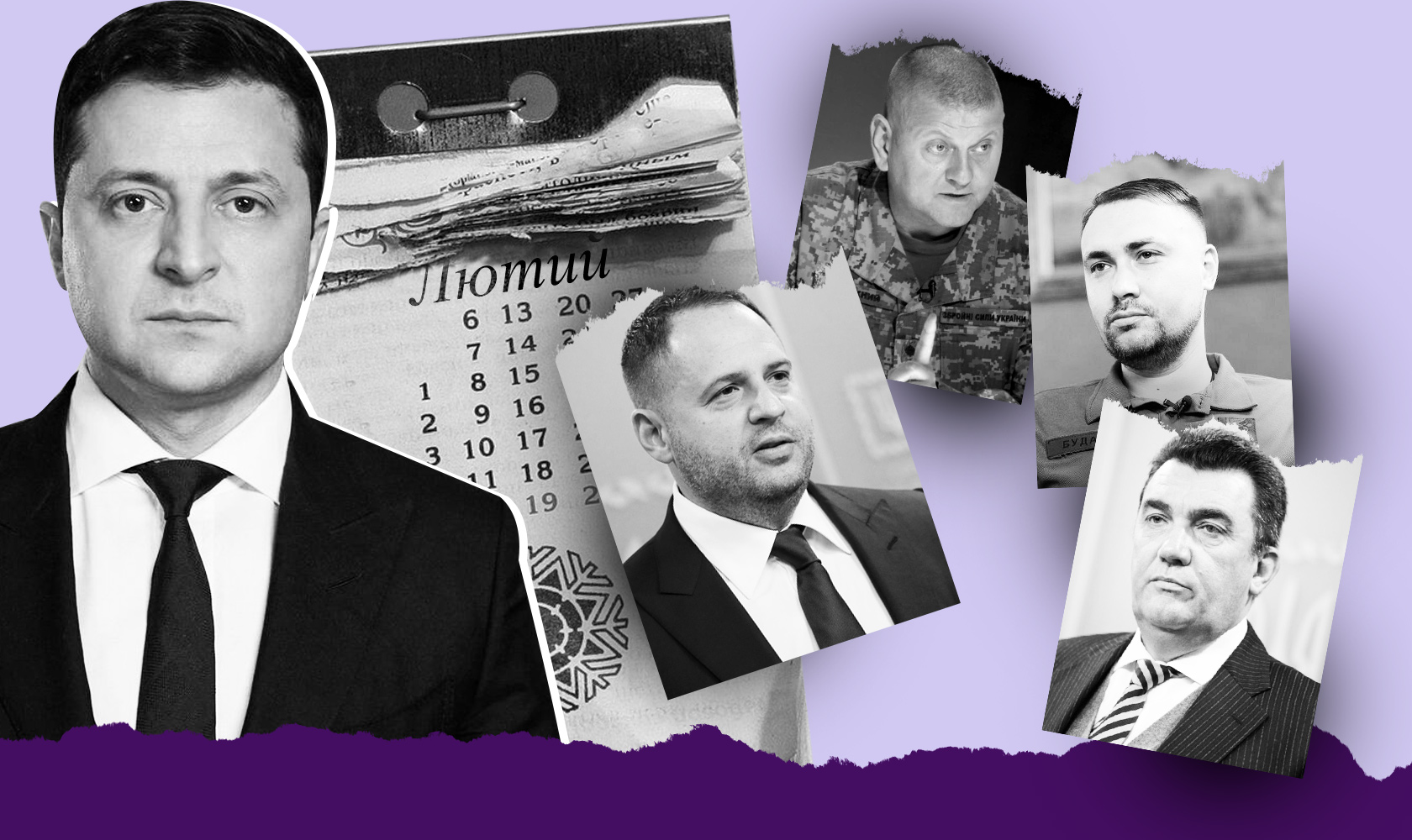
22 February 2022. A surprisingly warm day in Kyiv is drawing to a close. May with its barbecues is still a long way off, but you don’t often get +10ºC in the last few days of the calendar winter.
Oleksii Danilov, the Secretary of the National Security and Defence Council of Ukraine (NSDC), is in his office on the third floor of the Security Council building, waiting for the "red folder", a top secret daily intelligence report.
He gets the folder around 19:10. Oleksii Miacheslavovych [Danilov’s patronymic - ed.] skims the documents and calls the president straight away. Volodymyr Zelenskyy was at one of his countless meetings; their number was growing daily as the great war loomed large.
Instead of waiting for the president to finish his meetings, the NSDC Secretary quickly got into his time-worn Audi and told the driver to go to Bankova [the street in Kyiv where the Office of the President is located - ed.]. The information in the "red folder" could not wait.
After arriving at the Office, Danilov spoke with the head of Zelenskyy's personal security and the head of the State Security Department and then finally was able to report to the president himself: "The information from our partners suggests your life is in grave danger."
"Our partners would often tell us, ‘Guys, in the event of a war, your leaders will be murdered and you will end up in filtration camps and concentration camps’," Danilov says as he recalls the events of 22 February in a conversation with Ukrainska Pravda.
Zelenskyy, who was then working in "no time to die" mode, listened carefully to Danilov, thanked him, and headed off for another meeting.
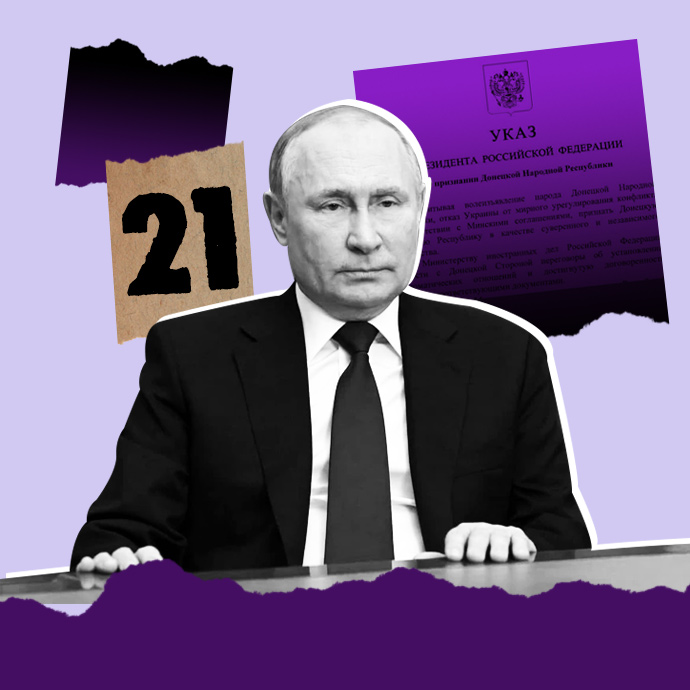
That day was already stressful enough. The day before, on 21 February, Russian dictator Vladimir Putin had held a meeting of the Russian Security Council and declared that Moscow "recognised the independence" of its puppet regimes in the occupied territories of Donbas, although it was not clear within which borders.
Ukrainian leaders in Kyiv remembered Russia acting similarly in Georgia in 2008. But no one on Bankova had guessed yet that this day could have been far more terrible: according to the Kremlin’s original plan, columns of Russian troops should have begun their advance on the capital of Ukraine and other Ukrainian cities on 22 February.
"The map read: 'To be issued on 20 February’. That is, the invasion was supposed to begin on 22 February. But something changed, 20 February was crossed out and someone had written '22 February’ instead", says Danilov.
The Russian invasion, delayed by two days for reasons still unknown, began on the night of 24 February.
Ukrainska Pravda has reconstructed the events that unfolded in Ukraine in the two days prior to the invasion and now offers an account of the first few hours of the Russian invasion of Ukraine.
This article will reveal what Kyrylo Budanov, Head of the Chief Intelligence Directorate of Ukraine’s Ministry of Defence, said to members of the Ukrainian parliament on 22 February; how business owners made an unfortunate joke about the owner of Rozetka [the biggest online retailer in Ukraine - ed.] at a meeting in the President’s Office; where Rinat Akhmetov [Ukraine’s richest businessman - ed.] went after meeting with the president on 23 February; [what was said during] Zelenskyy’s call with Boris Johnson [then Prime Minister of the UK - ed.] on the morning of 24 February; where Members of Parliament were issued weapons; and how the Cabinet of Ministers [the Ukrainian government] was evacuated to western Ukraine.
For this article, we spoke with more than 30 sources in the Office of the President, the Cabinet of Ministers, the Verkhovna Rada (Ukrainian Parliament), law enforcement officials and major business owners.
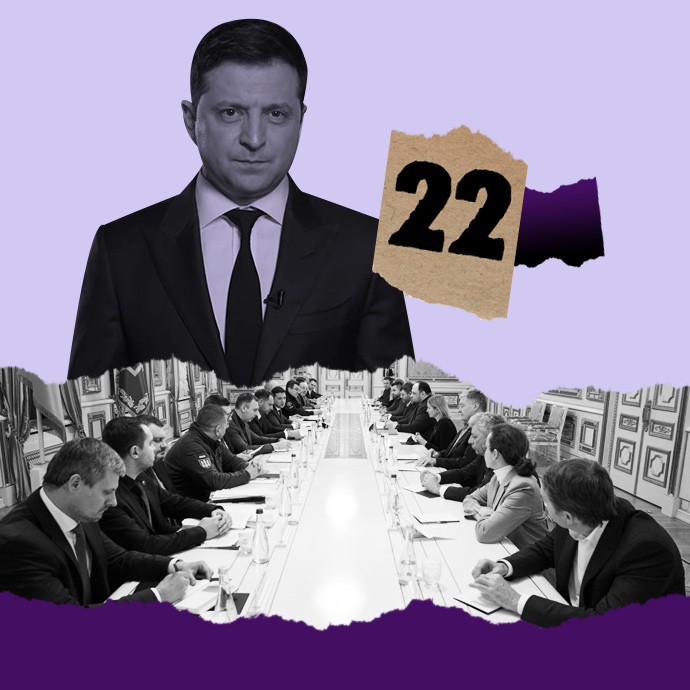
22 February: Response to Putin, Verkhovna Rada meeting, mobilising reservists
On 22 February, President Zelenskyy was in search of something rather elusive: he was trying to find the right words to quickly and forcefully respond to Putin. To leave Putin’s lengthy pseudo-historical speech unanswered would be to admit Ukraine’s weakness. This was about more than the fact that the Russian dictator had "recognised the independence of the L/DNR" [the self-proclaimed Donetsk and Luhansk People’s Republics - ed.]. Looking closely at that speech, it’s clear that Putin was questioning Ukraine’s very right to exist as a state.
"We didn't have time to watch Putin's entire Security Council meeting as well as his speeches. But we knew what he was preparing. Our intelligence reported what was about to happen," Andrii Yermak, head of the President's Office, recalls in a conversation with Ukrainska Pravda.
The President’s Office knew that Putin was preparing to announce his decision on Donbas, but they were struggling to believe that he would dare to wipe out eight years of negotiations and put an end to the Minsk Agreements in one fell swoop.
From the speech made by Volodymyr Zelenskyy at 02:40 on 22 February
"Great people of our great country, we and our state do not have time for long lectures on history, so I will not talk about the past, I will talk about the present and the future. Behind me is a map of Ukraine [the map was the backdrop to Zelenskyy’s video address - ed.] with its internationally recognised borders, and those will always be its borders...
Recognition of the occupied territories of Donetsk and Luhansk oblasts as independent may mean Russia's unilateral withdrawal from the Minsk Agreements and defiance of the agreements made within the Normandy framework...
[With the announcement of its recognition of the so-called "DPR" and "LPR",] Russia has essentially legitimised the presence of its troops in the occupied territories of Donbas, which dates back to 2014.
We can clearly distinguish provocations from an invasion by an aggressor's troops. The truth is on our side. And we will never hide the truth from you. We will inform you as soon as we see the situation begin to change, as soon as we see the threat grow..."
* * *
There was another sentence in Zelenskyy’s speech that was typical of his speeches in mid-February.
"We have been prepared for anything [that might come our way] for a long time. But there is nothing for you to lose sleep over," the president said two days before the start of Russia’s full-scale invasion.
Zelenskyy’s certainty that the recognition of the so-called "people’s republics" might turn out to be inconsequential was not just a rhetorical flourish. It was a belief shared by his entire team.
Around 14:00 on the same day, Ukrainska Pravda journalists were waiting for an interview with Defence Minister Oleksii Reznikov at the House of Officers in Kyiv. The minister was somewhat late. In fact, he was only two blocks away, in the Verkhovna Rada building, where he was trying to calm down the anxious Members of Parliament.
"At last, Russia has stopped obfuscating its presence [in Donbas]. That was an act of direct aggression on the part of the Russian Federation, but they attempted to conceal it. And now, as they say [in Venice], [Russia] has thrown off its mask," the minister explained.
Reznikov was calm and convincing as he explained that "Putin would not dare to bomb the ‘second Jerusalem’, the city of Kyiv." That was the headline of the interview with Reznikov which Ukrainska Pravda published at 05:00 on 24 February, just as the first Russian cruise missiles hit Kyiv.
* * *
On 22 February, the US began evacuating their embassy staff to Poland; they had been evacuated from Kyiv to Lviv just a week earlier. Around the same time, in Moscow, Putin asked the State Duma (the Russian Parliament) for permission to deploy the Russian army outside of Russia.
The Ukrainian government in Kyiv was aware of these omens of imminent disaster, but it clung to an illusion of normality until the end. Zelenskyy convened several meetings and was preparing for further meetings with MPs and business owners. He also continued to receive foreign visitors.
Each of these visits seemed highly symbolic, especially in light of the evacuation of several embassies and Western airlines’ decision to ban flights to Ukraine. The President’s Office had even hoped that Putin would not dare to attack Ukraine while a foreign leader was in the country. That was the reason why Ukraine’s entire diplomatic corps was working to organise daily visits to Kyiv by foreign officials.
On 22 February, Estonian President Alar Karis visited Ukraine. During his joint press briefing with Zelenskyy, journalists asked the president of Ukraine whether martial law might be introduced in Ukraine in light of Moscow's obvious preparations for war.
Without hesitating for a moment, Zelenskyy replied, "We believe that there will be no war." He paused and added in the same cold and calm manner: "[There will be no] brutal war against Ukraine. And there will be no extensive escalation by the Russian Federation. If there is, martial law will be imposed."
A few hours after Zelenskyy uttered these words, Putin would announce, in a similarly cold-blooded manner, that Russia recognised the puppet "republics" within the borders of Donetsk and Luhansk oblasts, including the territories under the control of the Ukrainian government.
Escalation seemed inevitable.
* * *
On the evening of 22 February, for the first time in the entire term of the Verkhovna Rada of the 9th convocation, President Zelenskyy invited the leaders of all the parliamentary factions to the President’s Office.
Zelenskyy had resorted to this format only once before. The day after his inauguration, he had gathered parliamentary leaders together to announce the dissolution of the previous convocation of the Verkhovna Rada.
On the evening of 22 February, Zelenskyy gathered the leaders of parliamentary factions and groups together to try to unite them.
The details of that meeting remained unknown at the time, because much of the information that was discussed was – and remains – classified as secret. But several faction representatives have told Ukrainska Pravda that Zelenskyy’s main focus at that meeting was creating what he himself referred to as a "defence coalition".
To emphasise the significance of the moment, the meeting was held on the presidential fourth floor of the President’s Office, in a large, light-filled hall usually used for international negotiations.
The president had invited all the top authorities, both civil and military, to present reports. So at the meeting, Zelenskyy sat flanked by Denys Shmyhal, the prime minister; Valerii Zaluzhnyi, Commander-in-Chief of the Armed Forces; Ivan Bakanov, head of the Security Service; and Kyrylo Budanov, head of the Chief Intelligence Directorate.
The leaders of the factions nodded and agreed with the president. Petro Poroshenko [the fifth president of Ukraine and leader of the European Solidarity party] was eager to "help wherever there is a need". Yulia Tymoshenko [leader of the Batkivshchyna party] said that the Russians outnumbered the Armed Forces of Ukraine, and therefore mobilisation was needed. The only one who did not speak was Yurii Boiko [who was a leading figure in the now-banned Opposition Platform — For Life ], whom the "wits" from the presidential team had seated right next to Poroshenko.
After the politicians’ speeches, the security officers took turns reporting. Since faction leaders have high access to state secrets, the security forces’ reports were quite frank. Valerii Zaluzhnyi spoke about the work of the Armed Forces of Ukraine, explaining that the army was preparing for all possible scenarios.
Bakanov and Reznikov, in contrast, rejected the possibility of a full-scale war. They only believed there might be psychological special operations by Russia and an aggravation of the situation in Donbas.
Yet it was his speech, as would become obvious within a day and a half, that was the most important and accurate.
Budanov took out a map from his papers and, with a calm, self-absorbed expression on his face, began to tell those present things that would make the blood run cold in their veins: the Russians could start a war outside Donbas; Kherson and Kharkiv are under threat; there is a threat to Kyiv; the Russians could try to enter from Chornobyl.
"Budanov was saying terrible things. But because other senior officials were responding to what he was saying almost with irritation, others did not take him seriously either. You know, their attitude towards what Budanov said was as if he was their younger brother." That is how one of the attendees recalls the atmosphere after Budanov's speech.
From the video address by Volodymyr Zelenskyy on 22 February:
"A patriot is someone who fights with the enemy for his land. And someone who invests money in it and creates jobs in it. Therefore, we are launching a programme of economic patriotism. These are additional incentives for the localisation of our production…
Today, all politicians and all parties are the same colour - blue and yellow…
I have signed a decree on the call-up of reservists for a special period. I emphasise that this only applies to citizens enrolled in the operational reserve. We must increase the readiness of the Ukrainian army for any potential changes in the operational situation…
Tomorrow I will have a meeting with the top 50 of our big business...
If we keep silent today, we will disappear tomorrow. Daily hard work awaits us. And we are ready for it..."
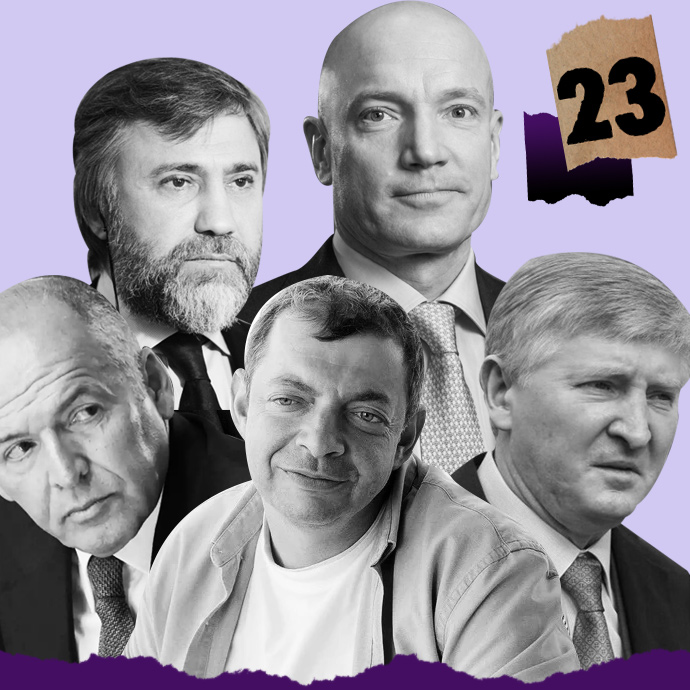
23 February: State of emergency and meeting with the oligarchs
For most Ukrainians, the morning of 23 February was not noticeably different from previous mornings during the last eight years of Russia’s hybrid war against Ukraine.
While the top management in Kyiv was just preparing for a new day of confrontation with Russia, a guest from Ukraine, unexpectedly for himself, was walking into the Oval Office of the White House in Washington.
The US president does not usually receive ambassadors or foreign ministers in his office. However, that day Dmytro Kuleba, Ukraine’s Minister of Foreign Affairs, and Ambassador Oksana Markarova were guests of Joe Biden. Prior to that, the Ukrainian minister had already met with his American counterpart, Antony Blinken.
The situation around Ukraine was so tense that the White House had decided to emphasise its support for Ukraine even more by receiving Kuleba in Biden's personal office and even producing a photo report of the meeting.

The only thing that cannot be seen in the photographs taken in the White House was the anxious, even mournful, atmosphere of this meeting.
After the official photos, Biden asked Kuleba about the situation, gave him some advice, and assured him of his support. However, the tone of his conversation sounded more like he was saying farewell to a child with cancer than encouraging an ally on the eve of a decisive battle.
When Biden said goodbye to Kuleba that day, he was saying farewell to all of Ukraine.
***
Meanwhile, in Kyiv, Kuleba's colleagues in power were assembling for a new meeting of the NSDC (National Security and Defence Council of Ukraine).
After the decisions Putin had made on 21 February, the NSDC had switched to 24/7 operation mode. On the morning of 23 February, all its members had to gather together to resolve a difficult dilemma: whether to introduce martial law, because Russia's preparations and activation of its satellites in Donbas appeared threatening.
The discussion at the meeting was quite lively. Commander-in-Chief Valerii Zaluzhnyi and Defence Minister Oleksii Reznikov defended their position: that the introduction of a state of emergency throughout the country might not be enough. They proposed the immediate introduction of martial law, albeit only in two or three oblasts in the east.
Nevertheless, the majority of those present at the meeting were afraid that by doing that, Ukraine would be handing the Russians a powerful argument. For several weeks, Russian propaganda had been broadcasting the lie that Ukraine was preparing for a major offensive in Donbas across all media.
The introduction of martial law in Ukrainian-controlled Donbas could have untied Russia's hands and given it a formal pretext for an invasion, justifying it by telling the world, "It was Ukraine that started the war and introduced martial law."
In the end, it was decided not to provoke Moscow. So, on the morning of 23 February, the presidential decree that the secretary of the NSDC submitted to the Verkhovna Rada for approval referred only to the state of emergency throughout the country and nothing about implementing martial law in Donbas.
The defensive coalition created in the Ukrainian Parliament on 22 February, however, collapsed before it had even lasted a day. Most of the opposition factions, which had promised all kinds of support the day before, started arguing with the state authorities.
"Petro Poroshenko, Yulia Tymoshenko and the Holos (Voice) party demanded that clauses about parties and media restrictions be removed from the decree. But Andrii Smyrnov (the deputy head of the President’s Office – ed.) insisted that the decree should be implemented as specified in the law," recalls Ukrainska Pravda’s source within the parliamentary leadership.
The office of Ruslan Stefanchuk, chairman of the Verkhovna Rada, became the place to look for a solution. Faction leaders were trying to amend the presidential decree, rewrite sentences or clarify the wording.
Time went by, the morning meeting ended, recess passed, the evening meeting came, and there was still no result from the defence coalition.
At one point NSDC Secretary Oleksii Danilov lost patience and snapped at the deputies, "We can argue over every single comma here with you, but do you have the slightest understanding that tomorrow we could be voting under martial law? Let's do something."
These words stopped the arguments for a brief moment. As a result, Parliament managed to vote the state of emergency through just before ten o’clock at night.
Things were looking pretty grim, especially amidst the new intelligence data provided by the United States: Russia had finally completed its preparations and could soon attack.
***
Ultimately, the deputies’ behaviour was a direct consequence of the state leader’s.
On that day, Polish President Andrzej Duda and his Lithuanian counterpart Gitanas Nausėda had visited Kyiv.
Asked by journalists whether he believed Putin would attack, Zelenskyy answered sarcastically that Putin's plans are "not a weather forecast", so there’s no point trying to predict them.
"But I do clearly know, without any predictions, how our army will act. I am sorry, but only the Ukrainian army and I will know the measures [we are taking] regarding the defence capability and defence of our state. And, believe me, we are ready for anything," Zelenskyy added.
As the following days and months showed, Zelenskyy had good reason to mention the entire defence sector’s thorough preparation for various possible scenarios.
As the president and the civilian part of his team was reassuring society with promises of May barbecues [a tradition in post-Soviet countries], the military wing of the government was preparing for the Russian invasion.
Clearly the Supreme Commander-in-Chief [Zelenskyy] could not have been unaware of such large-scale preparations. Unlike the aggressor, and even Ukraine’s allies.
US military officials have admitted that they knew a lot more about Russia’s plans and strategy than they did about Ukraine’s. And this partly explains why Western predictions about Ukraine's ability to defend itself turned out to be so inaccurate.
"Nevertheless, you can never fully prepare for war. You will never know how people will behave at a critical moment: who will be a hero, and who will betray you and give defence plans to the enemy," Danilov concludes bitterly.
***
Around 17:00 that day, elite motorcades were driving up Bankova and Luteranska Streets around the Office of the President. The owners of Ukraine’s 50 largest companies were rushing to their meeting at the President's Office.
The country’s wealthiest people - some with bodyguards and some alone - entered the territory of the President’s Office on foot and headed to the side entrance of the building.
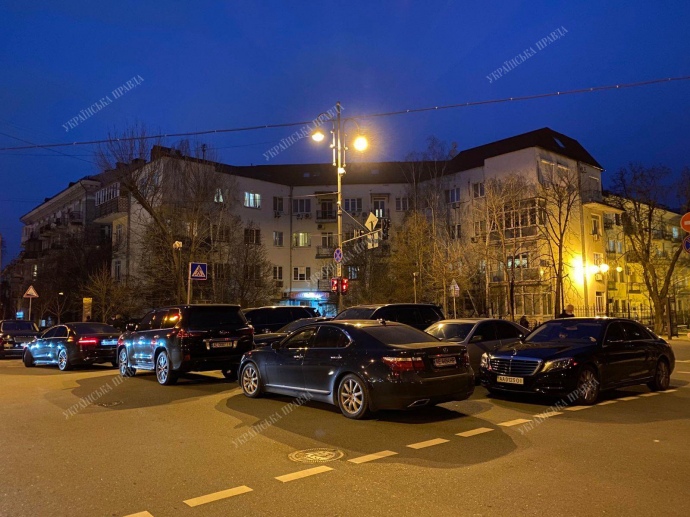
It was perhaps the first time in the entire history of Ukrainian independence that such a huge group of Ukrainian oligarchs and top managers had gathered in the hall of the President’s Office at the same time. At the entrance, representatives of the state guard asked each person their last name and searched for the guests one by one in the printed list as if they were a group of schoolchildren on an excursion rather than oligarchs.
Standing in the queue for a metal detector check were famous Ukrainian oligarchs such as Gennadiy Bogolyubov, Borys Kaufman, Halyna Hereha, Andrii Stavnitser, Hennadii Korban, Tomáš Fiala, Serhii Taruta, Borys Kolesnikov, Vasyl Khmelnytskyi, Stepan Ivakhiv, Maksym Timchenko, Oleh Horokhovskyi and many others.
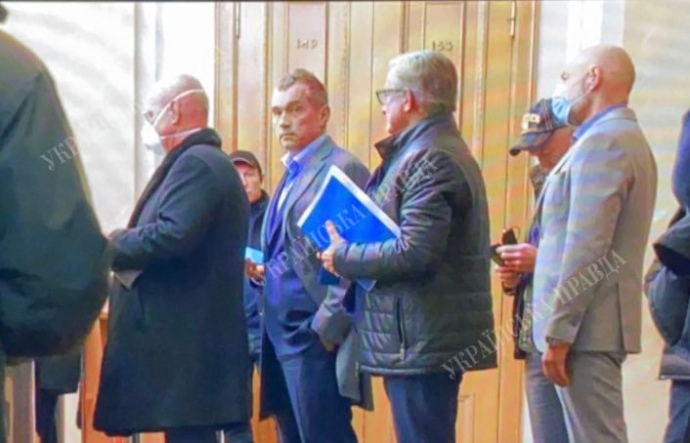
Rinat Akhmetov and Viktor Pinchuk had flown in from abroad especially for the meeting with the president. Unlike the other invitees, Akhmetov and Pinchuk did not enter through the "white" entrance of the President’s Office. Their motorcades were allowed into the courtyard.
After the metal detector check, the businessmen were politely greeted by employees of the President’s Office and escorted in groups to the state event hall on the second floor. Usually NSDC meetings were held around the huge round table there.
In order to get inside, guests had to go through one more procedure - they had to hand over their phones and watches to representatives of the State Security Administration.
Each guest had a reserved place. The business owners were invited to sit at the round table, to the left of the president, while the top managers were left with side chairs along the walls of the hall.
While they waited for the president, the guests greeted each other with short phrases and jokes.
In one corner, a group of businessmen were exchanging predictions about whether there would be a war. Suddenly someone in the group spotted Vladyslav Chechotkin, owner of online retailer Rozetka.
"Vlad, do you know why the Russian troops won't break through to Kyiv? Because they'll get stuck in the Rozetka warehouses," one of the attendees joked, and everyone laughed heartily, including Chechotkin.
None of those present could have imagined that within a few days, Russian tank groups would be advancing on Brovary, where the huge Rozetka logistics hub was situated.
At approximately 18:00, a quiet stirring began in the hall - the president was coming. Andrii Yermak, the head of the President’s Office, Prime Minister Denys Shmyhal, Serhiy Shefir, the first assistant to the president, Valerii Zaluzhnyi, Commander-in-Chief of the Armed Forces of Ukraine, Kyrylo Budanov, the head of the Chief Intelligence Directorate, Ivan Bakanov, former head of the Security Service, Oleksii Reznikov, the Minister of Defence, Denys Monastyrsky, the Minister of Internal Affairs, and Serhii Deineko, head of the State Border Guard, entered the hall together with President Zelenskyy.
"The president came in looking worried, but he remained calm. You know, his face was such a yellow, unhealthy colour," is how one of the business representatives describes his impression.
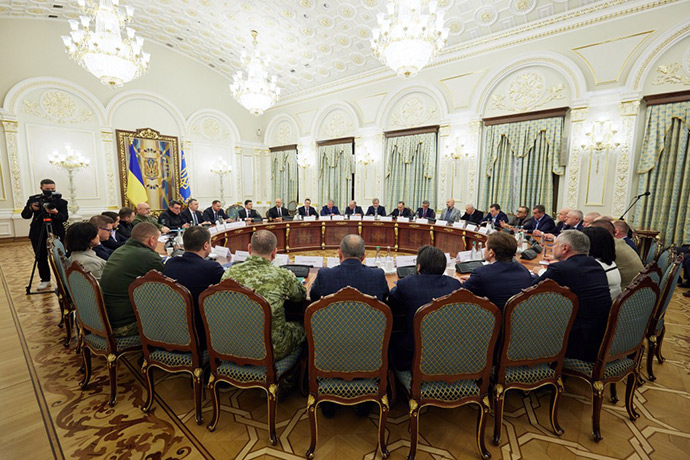
Zelenskyy briefly spoke to the press service and asked them to leave. There was silence for a brief moment - some of the businessmen were worried, afraid they were going to be asked to donate their money for something again.
"I’m telling you right away that I haven’t brought you all here to ask for money," was how the president opened his informal conversation. "Right now, it is very important that you help the state. I’m asking you to support the economy and support your teams. For our part, we will do our utmost to resolve the conflict through diplomatic means."
"We are using all possible channels," added Zelenskyy and, according to the meeting’s attendees, he looked intently towards the side of the table where Vadym Novynskyi and Rinat Akhmetov were sitting next to each other.
The businessmen listened attentively to the president, expecting to hear something new and important. However, Zelenskyy then handed over to the representatives of Ukraine’s security forces.
Defence Minister Reznikov was one of the first to speak, but according to those present, his speech was more like a "motivational speech by a personal development coach".
Then Commander-in-Chief Zaluzhnyi took over. Confidently, and fairly robustly, he reported on the Armed Forces’ preparations and emphasised that "the army is ready for any developments". After the meeting, some of the attendees agreed among themselves that it was Zaluzhnyi’s confidence that had reassured them the most.
After the representatives of the security forces, Rinat Akhmetov was the next to speak. Unlike the other businessmen, who were in good spirits, Ukraine’s wealthiest man looked nervous.
"I’d never seen Rinat like that before. His face was red, and he repeated several times, 'The most important thing is to save our people'," the representative of a large business told Ukrainska Pravda.
After Akhmetov, Viktor Pinchuk spoke about the importance of peace, and later Vadym Novynskyi took the floor and addressed the president: "We are doing everything we can to find a peaceful solution."
All of the businessmen speaking in the circle repeated words about the importance of peace.
The attendees were getting bored. Some of the businessmen began to whisper among themselves. The Surkis brothers, Ihor and Hryhoryi, stood out among them, sitting almost directly opposite Zelenskyy.
Those sitting outside the table then got their turn to speak. The floor was taken by Oleg Horokhovskyi, the co-founder of Monobank, who suggested that the authorities should increase the financial support for military personnel as soon as possible.
"For people to be prepared to defend the state, they must be highly motivated. It would be good to set the salary at around UAH 100,000, so that people understand what they are taking a risk for," Horokhovskyi is reported to have said.
Everyone supported this idea, and Zelenskyy especially liked it.
It was nearly 19:00 by then, and the President suggested bringing the meeting to a close: "We need to continue working," he said.
Towards the end of the event, Zelenskyy turned his head to the left and remembered that the prime minister, Denys Shmyhal, was sitting next to him.
"Denys Anatoliyovych hasn't said anything yet; we have to hear from the prime minister. Do you have anything to add?" the president asked Shmyhal.
"I completely agree with everything said here," the prime minister assured the president.
Shortly after 19:00, the oligarchs and top managers began to leave the President’s Office.
Some tried to get out unnoticed and jump into their cars as quickly as possible in order to bypass the journalists waiting in the courtyard of Bankova Street.
Others, by contrast, went on camera to talk with the journalists. They reported that the president's team was trying to prevent any escalation, saying, "Zelenskyy assured us that everything will be fine." However, none of them appeared concerned. On the contrary, it seemed that after meeting with the president, the businessmen felt relieved.
"Nobody told us then that there would be a full-scale war. It wasn’t even hinted at! Do you think we would have left the Office so relaxed and happy if it had been? I wouldn’t have wasted time chatting next to the Office about trivial matters - I would have been taking my family to a safe place instead", one famous top manager says with emotion, recalling the evening of 23 February in a conversation with Ukrainska Pravda.
After recording our interview with intelligence chief Kyrylo Budanov, Ukrainska Pravda asked him why he did not disclose the intelligence about Putin's plans at the meeting with the businessmen.
"Unlike MPs, they do not have access to state secrets, so we could not say everything. But I spoke quite directly, so it was not difficult to understand the level of the threat," Budanov assured us.
Most of those who attended the meeting did not really want to believe Budanov’s warning, preferring the more comforting reassurances given by the president and other representatives of the security forces. That applies to even the most well-informed people in the country.
For example, sources who are friends of Rinat Akhmetov say that after the meeting at the President's Office, the oligarch went not to the airport but to the bathhouse, where he let off steam until late at night and allegedly convinced his friends that there would be no war in the morning.
However, when he spoke to Ukrainska Pravda, Ukraine’s wealthiest man denied this: "There was dinner, but no bathhouse. I never go to the bathhouse in the evenings. And I didn't convince anyone that there would be no invasion."
***
Closer to 21:00, the president asked speechwriter Yurii Kostiuk, Andrii Yermak, the head of the President’s Office, and Dariia Zarivna, Yermak’s press secretary, to come to his office.
Zelenskyy wanted to discuss a new evening address to the people. This time it was not to be in the form of a report to the Ukrainians. Zelenskyy wanted to speak to the Russians.
The president dictated the outline of the speech to Kostiuk and Zarivna, considering the structure and artistic turns of phrase as he went. The speechwriters polished the text for some time, and it was nearly 23:00 when the president’s video team recorded the video.
"That evening, the president was like a man driving a car at night - with maximum concentration," Zarivna recalls in a conversation with Ukrainska Pravda.
And it must be admitted that if any appeal had even a slight chance of averting the war, it would have been the one Zelenskyy made on 23 February.
From the President's speech at 23:55 on 23 February [in Russian]
"I am addressing Russian citizens as a citizen of Ukraine.
We share a more than 2,000-km border. Your soldiers are stationed all along it, almost 200,000 soldiers, and thousands of military vehicles.
Your leadership approved their next step. A step onto the territory of another country. And that step could be the beginning of a great war on the European continent."
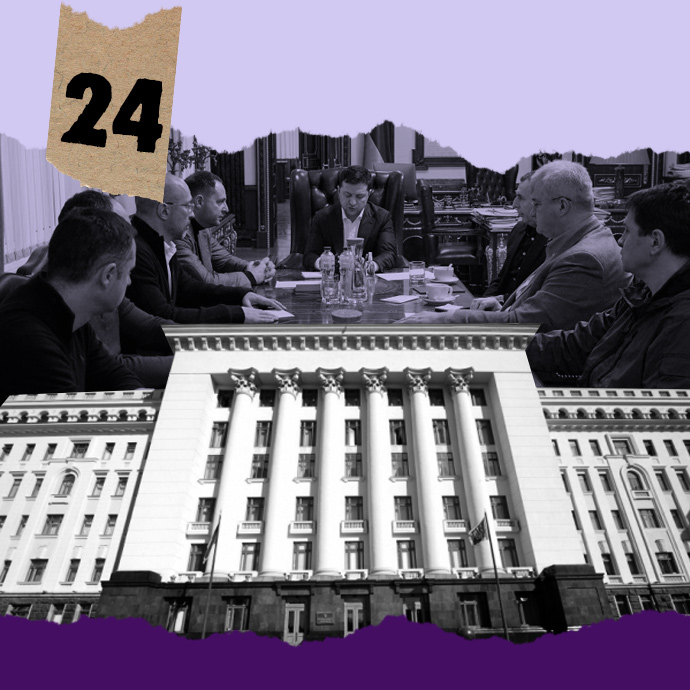
24 February: the invasion
At about 5:00 on 24 February, Kyiv was woken by missile strikes.
Olena Zelenska, the president’s wife, woke up from one of the explosions too. Zelenskyy was no longer in bed. She left the bedroom, perplexed, and found her husband in the next room. He was already dressed in a suit and a white shirt, but no tie.
"What happened?" she asked worriedly.
"It has begun," he replied, showing no emotion.
Meanwhile NSDC Secretary Oleksii Danilov had already sent his wife and son to the west of Ukraine. He started calling the members of the Security Council on their private mobile phones.
Ruslan Stefanchuk, the chairman of the Ukrainian Parliament, was one of the first to be woken up by him. Danilov asked him to come to the President’s Office and organise a meeting of the Council as soon as possible: "We must impose martial law, hurry."
Members of Parliament and other officials were waking up in different parts of the city. Those of them who had access to the state secret grabbed the secret envelopes that they had been given a few days before, and that were "to be opened in case of war".
"They were empty! There was only some basic stuff in there. Not a word about what I should really do!" an influential MP from the Sluha Narodu (Servant of the People) party recalled with emotion during an interview for Ukrainska Pravda.
Just as in bad Hollywood movies in which the weather always gets worse at the most critical moment, the warmth and sunshine gave way to gloom and cold drizzle on the first day of the invasion. It was hanging in the air above the thousands of cars sitting in traffic jams which blocked the exits from the capital in all directions within no time.
Shortly after 5:00, the president came out of the lift on the fourth floor of his office. Zelenskyy was the first to arrive at the President’s Office. He was not alone for long – the members of the National Security and Defence Council arrived at Bankova Street one after the other.
"It all happened in leaps and bounds. Everyone arrived, there was a short report, and then the document was signed by the president and taken to Parliament," recalls Defence Minister Oleksii Reznikov.
"Everything was prepared and printed. There were various packages of documents for different scenarios. We started registering the package as soon as it was signed by the president. We had prepared for everything, but we couldn’t tell anyone about it, even our families", Danilov adds.
MP Vadym Novynskyi woke up in his home just outside Kyiv after hearing explosions. He called Onufrii, the Metropolitan of Kyiv, then Patriarch Kirill of Moscow.
"Your Holiness, the war has started!" the worried MP said in Russian.
"That can’t be." Patriarch Kirill didn’t believe him.
"It is, otherwise why are my windows being rattled by explosions?" Novynskyi insisted. The Patriarch promised to find out what was going on, but it was already clear.
In the government quarter, the military and volunteers had started building the first barricades. In the suburbs of Kyiv, chaos reigned: frightened people stood in long queues at ATMs, petrol stations, food shops and pharmacies.
At about 6:40, then Minister of Internal Affairs Denys Monastyrskyi, NSDC Secretary Oleksii Danilov, and speechwriter Yurii Kostiuk were still in Zelenskyy’s office.
The president was standing in the middle of the room. He pulled out his iPhone, found the number he needed and put it on speaker.
UK Prime Minister Boris Johnson was on the other end of the line. It was 04:40 in London, but Johnson was full of energy, and he enthusiastically assured Zelenskyy that Ukraine was guaranteed the UK’s full support.
"We will fight, Boris, we are not going to give up," Zelenskyy was shouting into the speaker, trying to express himself properly in English.
"It was after Johnson’s first visit to Kyiv that he and Zelenskyy developed a close relationship. So they can just call each other on their private numbers if there isn’t much secrecy. There’s no time for 21st-century diplomacy when Russia has attacked your country," says Vadym Prystaiko, Ukraine's Ambassador Extraordinary and Plenipotentiary to the United Kingdom, explaining the nature of their relationship.
Shortly afterwards, the president’s communications switched to a special protected mode. The first person Zelenskyy called through this channel was US President Joe Biden.
"Everything was happening at once and simultaneously. An internal meeting here, an international call there. You move to the next room – there’s an international meeting, then a conference call with the security forces. I recall there was one moment when there was a short pause, and the president looked at us and went, ‘What else can we do? Any thoughts?’ And then it got hectic again." That’s how Andrii Sybiha, deputy head of the President’s Office, remembers the morning of 24 February.
* * *
That morning, Members of Parliament were trying to get to the Verkhovna Rada from different parts of the city, from both banks of the River Dnipro.
The day before, the Verkhovna Rada had instructed the leaders of the parliamentary factions that in the event of military action starting, they should go to their offices in the Parliamentary committees.
"Everyone was worried that the mobile connection would disappear first. Every Member of Parliament has a phone with a secure line in their offices - the so-called ‘sotka’ (‘hundred’). So we were told to sit by the phones and await further instructions," one MP explained.
Due to the constant threat of missile attack, the administration of the Verkhovna Rada considered the possibility of a retreat.
The National Museum of the History of Ukraine in the Second World War had been chosen for this purpose. There is a large room under the Motherland monument that can accommodate the 400+ MPs.
Closer to 7:00, the MPs were informed of the location of the retreat via WhatsApp.
"My colleagues and I arrived at the Motherland monument. There were already luxury cars there with Members of Parliament from the Servant of the People party standing beside them with suitcases. We asked them, ‘What are the bags for?’ They replied, ‘They told us there would be an evacuation.’ That was probably the only time that day that I laughed. It was obvious that no one would be evacuated," one interviewee from the Holos (Voice) faction recalls, laughing.
While the MPs were on their way to the museum, the Parliament administration changed its plans again. Within half an hour the heads of the factions were telling MPs to come back to the session in the Verkhovna Rada, texting them in group chats.
Firstly, the Parliamentary staff had had no time to organise a proper voting system at the retreat. Secondly, if there was video footage of the session being held in any other room than the assembly hall, it would have been perfect material for Russian propaganda, which would have come up with headlines like "The Ukrainian Parliament has fled the capital".
At about 8:00, the MPs started gathering in the Verkhovna Rada. Instead of elegant dresses and expensive suits, they were in tracksuits, bleary-eyed and with no make-up on, and instead of Prada, Gucci and Chanel handbags, they carried emergency suitcases for unpredictable circumstances.
A little while later, Ruslan Stefanchuk, the chairman of the Verkhovna Rada, arrived. He had come straight from the President’s Office, and he announced that only the president’s decrees on martial law and total mobilisation had been submitted for consideration.
After a short pause, Stefanchuk added that the session would not be closed so that it would be possible to get ready quickly and vote with no delay.
The MPs did not pay much attention to what the chairman was saying – they continued to discuss the worrying news.
In contrast to the state of emergency, which the Verkhovna Rada had spent the whole day on, martial law was voted through in just a few minutes. In total, the MPs spent no more than twenty-five minutes under the Parliament building’s dome.
After the vote, the faction leaders approached Stefanchuk, saying that these events necessitated an immediate meeting with the president.
Davyd Arakhamiia, the leader of the president’s Servant of the People faction, told them right away that it was impossible, but then he gave in to their pleading and texted the president, who replied that he would see all of the faction leaders in his office.
Curiously, none of the interviewees recalled whether the Verkhovna Rada or the Cabinet of Ministers had protocols for what to do in the event of a war starting. Even if there were any, the Ministers’ and MPs’ further work process was organised in the President’s Office on the day of the invasion anyway.
At about 9:00, the representatives of Parliament headed to Bankova Street. The delegation comprised the same members as two days ago. There were minor changes – Dmytro Razumkov, former speaker of the Verkhovna Rada, joined the delegation, and Yulia Klymenko from the Holos faction was replaced by Serhii Rakhmanin.
"I have never been checked like this! They inspected me down to my underwear!" That’s how a member of that delegation describes his attempt to get into the President’s Office.
As the Verkhovna Rada representatives were being invited into the President’s Office, to the Situation Room with its huge screens, members of the National Guard were carrying sandbags in, blocking the windows with them and setting up firing points.
At the press centre on the first floor of the President’s Office, there were a few bored reporters and Hollywood actor Sean Penn, whom nobody seemed to notice. Coincidentally, the actor was in Kyiv filming a documentary about Ukraine and could not have even imagined that a full-scale war would break out.
Mykhailo Podoliak and Oleksii Arestovych occasionally came down to see the reporters. The latter spoke loudly into his phone: "Honey, have you arrived in Chernivtsi Oblast?"
At that time Oleksii Danilov was on the first conference call with the heads of the Oblast State Administrations and security forces in the president’s Situation Room. He wasn’t paying much attention to the MPs who were quietly sitting at the big table.
"Hey, where’s Kherson? Can someone get in touch with Kherson? F**k it! Can someone from Kherson join us?" Danilov shouted with irritation at an empty window on the screen which had "Kherson Oblast State Administration" written on it.
In order to distract the MPs from the conference call, Arakhamiia started reading the news from private chats and commenting on them using explicit language.
Half an hour later, Volodymyr Zelenskyy entered the room with Andrii Yermak and Denys Shmyhal. The president greeted everyone with a handshake. He looked angry rather than tired. Yermak and Shmyhal looked confused. Neither said a word during the whole meeting.
"Colleagues, now we have to focus on cooperation. Our task is to preserve the legitimacy of power," Zelenskyy began.
Then he suggested moving the Verkhovna Rada to the west of Ukraine to protect it.
Two MPs - Dmytro Razumkov, former member of the National Security and Defence Council, and Petro Poroshenko, former President of Ukraine - objected to this suggestion.
"It will become public knowledge, and the Russians will start spreading a narrative about the Ukrainian government fleeing - we can’t let that happen," they argued.
Finally they found a compromise - they agreed that Stefanchuk would stay in Kyiv while Oleksander Kornienko, the first deputy chairman of the Verkhovna Rada, would go to one of the neighbouring oblasts. Olena Kondratiuk, the second deputy chair of the Verkhovna Rada, would go to the west of Ukraine. If a senior leader was killed, a junior one would have to replace them.
After that, everyone who was present had an opportunity to say what they needed to the president.
At one point Petro Poroshenko turned to Zelenskyy and said, "Let’s focus on working together to win. I recommend you create a Supreme Commander’s Office. You will be in charge of this office, and I am ready to become a member of it and help you."
As always with Poroshenko’s suggestions, the MPs were not sure if he was being sincere or just trying to find a way of being in charge. Zelenskyy paid little attention to his words and just moved on to the next speaker. Later he did set up a Supreme Commander’s Office, but didn’t invite Poroshenko to join it.
Then, after about half an hour of the meeting had passed, the chief of the President’s guard almost burst into the Situation Room. The secret services had informed them that Russian sabotage and intelligence groups were already active in the Pechersk district of Kyiv, a few blocks away from the President’s Office. Furthermore, the chief of the guard said, there was a serious threat of a missile attack on the President’s Office.
Suddenly, armed members of the State Security Administration of Ukraine entered the room and almost dragged the president away from the meeting to a "safe place".
That’s how Zelenskyy ended up in the bunker for the first time. He would govern the country from there for the next few weeks.
The MPs, as well as a bunch of reporters who had been invited to the President’s Office before that, were asked to leave the building immediately and move outside the borders of the government quarter as soon as possible.
Shortly afterwards, MPs received a message from the faction leaders: "Weapons are being handed out at the National Police headquarters on Volodymyrska Street."
During the day, those MPs who had not left Kyiv received shotguns and pistols from the police after they had checked their passport and MP’s mandate. Very soon the police started running out of pistols, so they decided to give them only to female MPs.
In one of the queues for weapons, someone asked the police officer responsible why they were handing out pistols to female MPs at all.
A tired man sighed and spoke quietly, "A time will come, and you’ll understand."
"Is that a hint that we will have to shoot ourselves?" the women tried to joke.
***
Around 11:00, Denys Shmyhal held a conference call with members of his government.
The prime minister already had a solution in mind: in order to keep running the country, the Cabinet of Ministers would be divided in two.
First, he read out a list of those who would remain in Kyiv: the Ministers of Internal Affairs, Healthcare, Infrastructure, Energy, and Defence.
The majority of government ministers, meanwhile, would take a special train to a relatively safe oblast in western Ukraine.
"You are the core team, you’ll have a quorum for decision-making," Prime Minister Shmyhal said on camera during the video call.
Iryna Vereshchuk, deputy prime minister and the Minister for the Reintegration of the Temporarily Occupied Territories of Ukraine, suddenly interrupted Shmyhal.
"I’m not going anywhere. What will I do there?" she fired off, visibly emotional.
"This is the president’s decision," Shmyhal attempted to reason with her.
"I’ll speak to the president about it then," Deputy Prime Minister Vereshchuk retorted. In the end, she remained in Kyiv.
Prime Minister Shmyhal and President Zelenskyy put Oleksii Chernyshov, Minister for Communities and Territories Development of Ukraine, in charge of the evacuation of the government.
Soon after the conference call, the ministers that were leaving Kyiv created a WhatsApp group chat, which they named simply "24 February". They used the chat to discuss their work in exile.
Oleksii Chernyshov and Oleksandr Kubrakov decided to use two separate trains in order to evacuate all of the government officials who were supposed to be evacuated, as well as their families and all of the relevant documents.
The first train was set to depart from Kyiv’s Central Railway Station at 14:00 and the second at 16:00.
***
The departure of the government’s evacuation train kept being delayed. The noisy, anxious government officials and ministry employees had already made their way from the chilly platform to the warm train carriages, but the train continued to stand still.
Chernyshov called Kubrakov again and again: "What’s going on, Sasha? When will the train depart?"
"It’s total chaos here! I’m trying! We’ll do our best," Kubrakov responded, calling official after official in an attempt to finally evacuate the government from the Ukrainian capital, which the enemy was approaching from two directions.
Where would the train go? To conceal their true intentions, Chernyshov had informed several Oblast State Administrations that the Cabinet of Ministers would be evacuating to their oblast. No one knew where the government was really going, but all of them were making preparations to host it.
Not only did most of the passengers not know where they were going, the train drivers didn’t either. They were only given the name of the next station they were supposed to drive the train to, one station at a time, a short distance between each station.
Chernyshov introduced a few additional turns to the train’s route to make sure it was impossible to follow it. Eventually, the second train caught up with the first one. Together, they set out for Ivano-Frankivsk.
Perhaps no metaphor for the Ukrainian government on the morning of 24 February could be more fitting than an overcrowded train heading west. A train guarded by a single security guard with a gun, and a driver who has no idea where he is going or whether he will ever get there.
ROMAN KRAVETS, ROMAN ROMANIUK